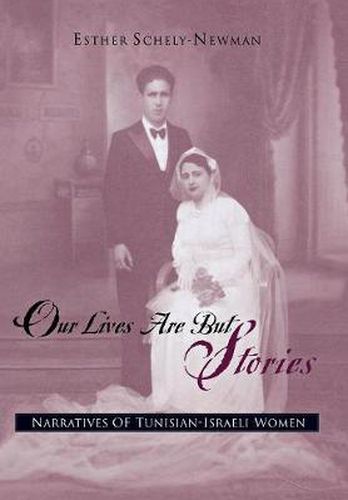Readings Newsletter
Become a Readings Member to make your shopping experience even easier.
Sign in or sign up for free!
You’re not far away from qualifying for FREE standard shipping within Australia
You’ve qualified for FREE standard shipping within Australia
The cart is loading…






This title is printed to order. This book may have been self-published. If so, we cannot guarantee the quality of the content. In the main most books will have gone through the editing process however some may not. We therefore suggest that you be aware of this before ordering this book. If in doubt check either the author or publisher’s details as we are unable to accept any returns unless they are faulty. Please contact us if you have any questions.
Our Lives Are But Stories explores the crucial role of personal storytelling in the lives of a unique generation of women - Jewish women who left the Muslim country of Tunisia to settle in the newly created Israeli state. To this day, the older generation of Tunisian Israelis continues to rely on storytelling as a form of education, entertainment, and socialization. But for women this art has taken on new dimensions, especially as they seek to impart their values to the young. Here Esther Schely-Newman expertly interweaves the personal accounts of the private lives of four Tunisian-Israeli women to analyze the rich complexities of communication. She considers how various approaches to narration reflect storytelling as a cultural phenomenon and highlights the need to understand stories in the contexts in which they are told. The four narrators grew up in a culture in which women’s stories were confined to the private sphere, were usually told to other women, and were supposedly fiction - or at least metaphors masking their real lives. Forced migration to farming communities in Israel and the shock of being uprooted created new identities for women and new outlets for storytelling. Women narrators increasingly began to tell more openly of their personal lives. Schely-Newman organizes her narrators’ accounts by the themes of childhood, marriage, motherhood, immigration, and old age and considers a wide range of factors that shape the narration, including audience, intent, choice of language, and Jewish-Muslim culture. The result is a fascinating blend of analysis, narration, and history.
$9.00 standard shipping within Australia
FREE standard shipping within Australia for orders over $100.00
Express & International shipping calculated at checkout
This title is printed to order. This book may have been self-published. If so, we cannot guarantee the quality of the content. In the main most books will have gone through the editing process however some may not. We therefore suggest that you be aware of this before ordering this book. If in doubt check either the author or publisher’s details as we are unable to accept any returns unless they are faulty. Please contact us if you have any questions.
Our Lives Are But Stories explores the crucial role of personal storytelling in the lives of a unique generation of women - Jewish women who left the Muslim country of Tunisia to settle in the newly created Israeli state. To this day, the older generation of Tunisian Israelis continues to rely on storytelling as a form of education, entertainment, and socialization. But for women this art has taken on new dimensions, especially as they seek to impart their values to the young. Here Esther Schely-Newman expertly interweaves the personal accounts of the private lives of four Tunisian-Israeli women to analyze the rich complexities of communication. She considers how various approaches to narration reflect storytelling as a cultural phenomenon and highlights the need to understand stories in the contexts in which they are told. The four narrators grew up in a culture in which women’s stories were confined to the private sphere, were usually told to other women, and were supposedly fiction - or at least metaphors masking their real lives. Forced migration to farming communities in Israel and the shock of being uprooted created new identities for women and new outlets for storytelling. Women narrators increasingly began to tell more openly of their personal lives. Schely-Newman organizes her narrators’ accounts by the themes of childhood, marriage, motherhood, immigration, and old age and considers a wide range of factors that shape the narration, including audience, intent, choice of language, and Jewish-Muslim culture. The result is a fascinating blend of analysis, narration, and history.